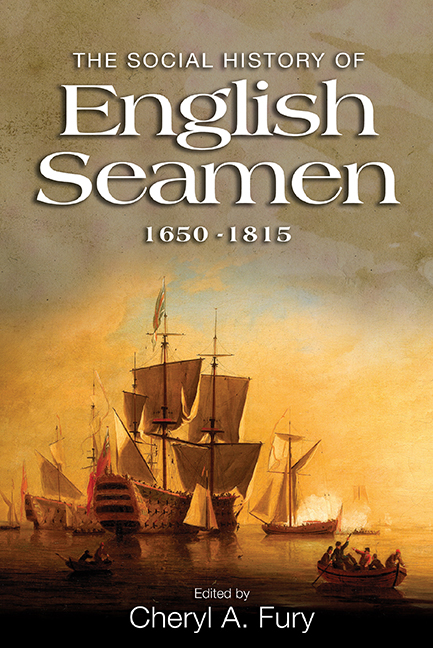Book contents
- Frontmatter
- Dedication
- Epigraph
- Contents
- List of illustrations
- List of contributors
- List of abbreviations
- Introduction
- 1 The Development of Sea Power, 1649–1815
- 2 Naval Seamen, 1650–1700
- 3 Officers and Men of the Navy, 1660–1815
- 4 The Impact of Warfare on Naval Wives and Women
- 5 Officers, Shipboard Boys and Courts Martial for Sodomy and Indecency in the Georgian Navy
- 6 Health Provision in the Royal Navy, 1650–1815
- 7 The Origins and Careers of English Merchant Seamen in the Late Seventeenth and Early Eighteenth Centuries
- 8 Private Enterprise, Public Policy and the Development of Britain's Seafaring Workforce, 1650–1815
- 9 Jack Tar's Food: Masculine Self-fashioning in the Age of Sail
- 10 Pirates, Privateers and Buccaneers: The Changing Face of English Piracy from the 1650s to the 1720s
- Conclusion
- Bibliography
- Index
9 - Jack Tar's Food: Masculine Self-fashioning in the Age of Sail
Published online by Cambridge University Press: 11 August 2017
- Frontmatter
- Dedication
- Epigraph
- Contents
- List of illustrations
- List of contributors
- List of abbreviations
- Introduction
- 1 The Development of Sea Power, 1649–1815
- 2 Naval Seamen, 1650–1700
- 3 Officers and Men of the Navy, 1660–1815
- 4 The Impact of Warfare on Naval Wives and Women
- 5 Officers, Shipboard Boys and Courts Martial for Sodomy and Indecency in the Georgian Navy
- 6 Health Provision in the Royal Navy, 1650–1815
- 7 The Origins and Careers of English Merchant Seamen in the Late Seventeenth and Early Eighteenth Centuries
- 8 Private Enterprise, Public Policy and the Development of Britain's Seafaring Workforce, 1650–1815
- 9 Jack Tar's Food: Masculine Self-fashioning in the Age of Sail
- 10 Pirates, Privateers and Buccaneers: The Changing Face of English Piracy from the 1650s to the 1720s
- Conclusion
- Bibliography
- Index
Summary
Traditionally, historians have been interested in the food of the early modern deep-sea sailor in its relationship to operational effectiveness in European navies, the ability (or inability) to conduct long-distance voyages of trade or discovery, and the history of nutritional diseases. These are worthy topics and the literature is extensive. The present study addresses the question: what were the cultural meanings of a scarce and regulated commodity – food – within the virtually all male, hierarchically structured society of the eighteenth-century British sailor? It draws primarily upon first-hand narratives, designed to be read by Britons who were ‘landlubbers’, separated (it was assumed) by geography and culture from the authors’ own seagoing communities. Three authors will be emphasized: Matthew Bishop of the Royal Navy (1702–6); George Marshall of the East India Company (1769–78); William Spavens of the Royal Navy and East India Company (1755–66). A contextual study of their writings concludes that the cultural meanings ascribed to food at sea, on board these large ships operated by powerful institutions, resided firmly in the discourse over manly virtue.
Matthew Bishop
The Life and Adventures of Matthew Bishop of Deddington in Oxfordshire appeared in London in 1744. The author began his narrative in the year 1701, when Bishop stated that he left his birthplace of Deddington to become a junior clerk in a merchant's counting-house in Canterbury, Kent. However, being ‘of a rambling Disposition’, he enlisted as a sailor in the Royal Navy in February 1702 just as England was about to enter the War of the Spanish Succession. Over the course of seven chapters, Bishop described his service in the Navy, in various theatres of the conflict. In 1706, he entered the Army, served as a corporal at the Battle of Oudenarde and the siege of Douai, and later participated in the Canadian expedition of 1711. The memoir concluded in 1713 when Bishop's regiment was disbanded and he returned to Deddington. The substantial message throughout is of the valour of the common, rightthinking, Englishman in martial duty. Bishop never asked directly what constituted manliness in service to one's country in the Navy or Army, but his readers were left in no doubt.
- Type
- Chapter
- Information
- The Social History of English Seamen, 1650-1815 , pp. 183 - 212Publisher: Boydell & BrewerPrint publication year: 2017



